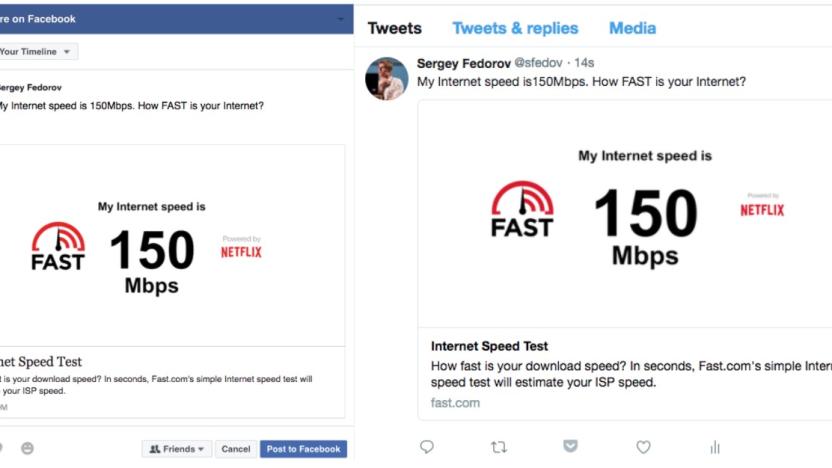speedtest
Latest

Ookla: Minneapolis has the fastest mobile internet among US cities
If you live in or often visit Minneapolis, Ookla has good news for you: the company says that locale tops the list of US cities with the fastest mobile internet, with a mean download speed of 44.92 Mbps. Ookla, which analyzed data from its Speedtest app from the first half of the year, said Minneapolis' Twin Cities brethren Saint Paul was in second place, followed by Fort Wayne, Indiana; San Francisco; and Irvine, California. Atlanta and Pittsburgh followed those cities, while Minnesota was also the fastest state.

Speedtest shows global internet speeds are up this past year
While Netflix and Google both have new internet speed tests on offer, Ookla's Speedtest is still the grandaddy of them all. Last August, it launched the Speedtest Global Index, a tool that surfaces internet speeds around the world, helping you see how your country or region measures up. The company is refining its approach with the introduction of Global Speed, a tool that shows the average internet speed of the entire connected world.

Netflix adds social sharing to its Fast.com speed test
Back in 2011, Netflix started issuing ISP report cards to head off possible throttling, and now, as the future of net neutrality is in doubt it's upgrading Fast.com. The simple speed test debuted last year, and according to Netflix has already been used over 250 million times, with an even split between people testing on desktop or mobile devices (there's an app). Now, anyone who uses it can easily share their results on social media, where they can be quickly checked by and compared with others. While Netflix's large customer base should head off most attempts by ISPs to mess with it, if there's another situation where connections drop off then this tool could be useful for spotting and sharing the news.

T-Mobile has the fastest and most consistent mobile data in the US
Speedtest owner Ookla has revealed its findings about who has the fastest mobile network in the United States. The outfit found that T-Mobile took the top spot over Verizon and AT&T with average speeds hitting 23.17 Mbps, 21.13 Mbps and 20.05 Mbps, respectively. That holds true overall under a number of different categories as well. T-Mobile is also the fastest carrier in 40 percent of the largest U.S. cities, but Ookla notes the following:

Denver has the fastest WiFi of any airport in North America
Airports are some of the most miserable places on earth. On top of being charged way too much for food and booze, solid internet connections can be dodgy whether you're connecting to provided WiFi or your cellular network. The folks at Speedtest have done us all a favor and surveyed the offerings at North American airports to suss out the worst to the... surprisingly not-worst. Interestingly enough, a state that legalized recreational marijuana also has the highest uploads and downloads. Denver International boasts 78.22 Mbps downloads and 78.29 Mbps on average, with Speedtest reporting that this actually increased by over 25 percent since its last look.

Netflix launches Fast.com, a dead-simple speed test
For obvious reasons, Netflix is obsessed with the speed and quality of your internet connection. To help keep you up to date on how your connection is doing, it's launched Fast.com, a trademarked webpage that simply loads and runs a speed test, no user intervention necessary. While it also links to speedtest.net to help those looking for more details and control, Fast.com is pared down with no ads, no plugins, no configuration and not even an option to check upload speeds.

DARPA starts speed testing its submarine-hunting drone ship
DARPA's 130-foot unmanned ship is almost ready to take on rogue submarines. Its christening isn't slated to take place until April 7th, but it's now in the water near its construction site in Portland, Oregon -- the agency has even begun conducting speed tests. The drone called ACTUV or Anti-Submarine Warfare Continuous Trail Unmanned Vessel has successfully reached the top speed its creators were expecting (31mph) during the preliminary tests. It was, however, designed to do much more than traverse the oceans at 31mph. ACTUV has the capability to use long/short-range sonar to detect foreign submarines, even stealthy diesel electric ones that don't make noise.

FCC Speed Test app for iOS lets the government track your iPhone's network performance
Downloading an app from the federal government might not top your list of priorities at the moment, but if you're looking to tick that public service box without a need to worry about measly pay, background checks and furloughs, the FCC could sure use your help. That org's latest venture, the FCC Speed Test app for iOS, delivers yet another connectivity benchmark tool to iPhone and iPad users. This free download also benefits the government's Measuring Broadband America program, however, enabling the FCC to build out a public database of network performance across the country. Unlike its Android counterpart, this iOS app doesn't test performance in the background, so you'll need to fire it up to see how well your cellular or WiFi connection is doing. It's available from the App Store today.

FCC will get you to tell it how fast your mobile broadband is
Remember when the FCC said that it'd be studying the best way to monitor mobile broadband speeds? A year (and a new chairman) later and it's finally come to a conclusion: an Android app. According to the Wall Street Journal, the commission will launch FCC Speed Test next Thursday, with the aim of getting users to test their speeds in order to crowdsource accurate data nationwide. We're excited to see if the truth stands up to the advertising, but we do wonder if Tom Wheeler couldn't have just nicely asked Ookla for a peek at its Speedtest.net database.

T-Mobile LTE speed test on iPhone 5
Engadget covered T-Mobile's Un-Carrier event yesterday and was able to get some hands-on time with an iPhone 5 connected to the carrier's new LTE network. The team from Engadget did what most good techies would do -- they fired up Ookla's SpeedTest app to see how T-Mobile's flavor of LTE performed. Engadget tested the LTE network with two different iPhone 5 handsets and recorded download speeds between 18 and 26 Mbps. Upload speeds clocked in at a respectable 10 Mbps and ping times were under 50ms. These early numbers are promising, but it remains to be seen what happens to these speeds when thousands of subscribers start to surf and stream at the same time. Nonetheless, it's nice to see another carrier enter the LTE market with affordable wireless plans and low upfront payment options for phones.

New National School Speed Test hopes to help all K-12 students get effective digital learning
With 99 percent of the nation's K-12 schools hooked-up to the internet, you'd think online learning was an educational staple. Sadly, it's also estimated that some 80 percent of those connections can't provide the 100Mbps per 1,000 students bandwidth the State Education Technology Directors Association recommends. That's why NPO EducationSuperHigway has announced the National School Speed Test initiative, with the goal to take actual stock of the state of internet connections in our schools. The NSST hopes to measure the internet capabilities of every K-12 school, and identify those that are lagging behind. Educational staff and students can also help out by checking their own school's speeds on a dedicated website (linked below). The results of the NSST will be open to the institutions themselves, districts and state departments of education, enabling them to better plan upgrade strategies for the future.

We test speeds on EE, the UK's first LTE network! (video)
Formerly known as Everything Everywhere, also known as the union of Orange and T-Mobile's UK networks, it's now going under the name EE and (finally) bringing LTE to the British Isles in the coming weeks. We decided to see what that means by running Speed Test on the device -- and it's looking good. Upload speeds averaged around 20Mbps, while downloads peaked around 38Mbps -- consistently above 25Mbps. If you're wondering what this means for how you'll normally use your phone, Angry Birds' 20MB-plus app download rocketed down from the new network and this very site appeared in an instant. See for yourself after the break. %Gallery-164916%

ASUS Transformer Pad TF300 with LTE stretches its legs on O2 in Germany (video)
It wasn't all that long ago, that the FCC tempted us with the idea of an LTE capable Transformer Pad TF300. Now, a video has popped up online from Germany's O2 network showing of the speedy tablet in all its 42 Mbps down / 32 Mbps up glory. After the obligatory speed test, you can see YouTube videos loading up a charm, along with plenty of other HD video being scrubbed along like it wasn't even a thing. A quick tour of the white-backed version reveals little else of note, but if the lack of LTE was keeping the dollars in your wallet, this might just be enough to tease them back out. [Thanks, Alexis]

US 3G and 4G networks face off once more, Verizon just squeaks out win over AT&T
Competition for the US cellular speed crown is certainly fiercer than it was last year, when Verizon's 4G LTE let it walk over the competition unimpeded. With AT&T's LTE in the running, though, have the ranks changed? No, but only just barely: as PCMag discovered in its annual countrywide testing, Verizon mostly trumped its fellow telecom giant in upload speeds and reliability. AT&T could once more claim to be best in a category with the fastest downloads, although it's counterbalanced by having a considerably smaller LTE network. For everyone outside of T-Mobile and its still very respectable HSPA+ network, it's better luck next year. We'll be most intrigued then, quite frankly -- in addition to 2013 giving us a genuinely functional Sprint LTE network, that's when we could see a blistering-fast T-Mobile LTE-Advanced produce an upset victory.

Sprint's early 4G LTE network tested in controlled conditions, hangs with the big boys
Sprint doesn't have much time to meet its goals and get its 4G LTE network up and running by mid-2012. The Now Network is definitely getting closer, though, and just gave PCMag the chance to test its fledgling LTE in Atlanta. Average speeds on the downlink sit squarely in between AT&T and Verizon, at 9 to 13Mbps, despite Sprint having to use 5MHz channels half as large as what AT&T can muster in some cities. Just don't expect to upload 4K videos from your phone anytime soon: the 2.2Mbps average upload rate is certainly faster than on WiMAX or T-Mobile's HSPA+ network, but it doesn't hold a candle to the 4Mbps or even 6Mbps of Sprint's bigger rivals. We'd likewise take the results with a large grain of salt. Even though Sprint is promising to focus on consistently good speed rather than bragging rights, the tests are in controlled conditions on a mostly unpopulated network. Our hope for now is just that the network goes live and that our EVO 4G LTEs live up to their potential.

HTC Velocity runs impressive speed test on Australia's new 4G network
How fast is Telstra's new 4G network? Pretty darned fast, according to a recent speed test that Ausdroid ran on an HTC Velocity -- Australia's first 4G handset. As the above image clearly demonstrates, the device impressively managed to reach download speeds of 32.82Mbps, with upload rates of 11.26Mbps. Ausdroid was quick to point out that speeds will likely vary across Telstra's network, though it wasn't the only one to report astronomic numbers. Trevor Long, in fact, actually managed to top Ausdroid's results, with a whopping 39.85Mbps downstream, and 11.88Mbps upstream. He also posted an image to his Twitter account, just to rub it in. Update: Long has actually outdone himself yet again, reaching speeds of 40.77Mbps (down) and 20.07Mbps (up). Photographic evidence after the break. [Thanks, Jason]

Verizon-branded Galaxy Nexus runs impressive 4G LTE speed test on two bars (video)
How fast can the Samsung Galaxy Nexus run on Verizon's 4G network? Pretty darn fast, according to a freshly leaked video. Originally spotted by the folks over at Phandroid, the clip shows a Verizon-branded Galaxy Nexus performing rather admirably on a speed trial from Speedtest.net, reaching download speeds of 8.5Mbps, and upstream rates of 2Mbps -- all on just two bars of signal. It's worth noting that the clip hasn't received Verizon's official blessing, though it should certainly whet some appetites ahead of the handset's apparently imminent release. Check it out for yourself, after the break.

Droid Bionic teases boot sequence, LTE prowess to anxious onlookers (video)
That's right folks, the Droid Bionic is back with another leaked appearance. This time it stars in a video clip that reveals the phone's boot sequence, which is followed by an all-important thrill ride / speed test on Verizon's LTE network. As if you needed further proof, this Moto reveals itself to pack dual cores, and as you might expect, it sports Motorola's animation-laden skin. What about the LTE test, you ask? It pulls in respectable numbers -- approximately 4.5Mbps down and 1.9Mbps up -- but as you're likely aware, these speeds pale in comparison to what we've seen on the Droid Charge and Revolution. It's entirely possible the test is simply an outlier, so we'll hope for better scores as the phone approaches its September arrival. Curious for the sneak peak? You'll find the full video after the break. [Thanks, Tu]

Google Fiber beta test goes live, bathes Stanford in high-speed regularity
When we last checked in on the Google Fiber project, engineers were busy laying the groundwork for a 1Gbps network across both Kansas Cities, while preparing to launch a beta test near Stanford. Now, it looks like the beta service has gone live in the Palo Alto area, according to a lucky Reddit user who claims to be using it. The ISP is available free of charge to students and faculty members within the area, at pretty mouth-watering speeds. No word yet on when the Kansas City communities will receive similar treatment, but you can gaze in awe at the Stanford Speedtest result, after the break.

Engadget Primed: Using benchmarks
Primed goes in-depth on the technobabble you hear on Engadget every day -- we dig deep into each topic's history and how it benefits our lives. Looking to suggest a piece of technology for us to break down? Drop us a line at primed *at* engadget *dawt* com. Staring at your smartphone, you realize that there's something missing. It does everything you want it to -- very well, we might add -- but what hole is left to fill? We'll help you out with this one: you want bragging rights. There has to be a way to face your friends with confidence, right? All you need is a little nudge in the right direction, and in this edition of Engadget Primed, we'll give you that much-needed shove by explaining benchmarks. Perhaps you've seen us talk about benchmarks in our product reviews. We'll typically use them to gauge the relative performance of various devices, but discussing a Linpack score doesn't mean much without going deeper into what it actually means. What aspects of performance do these benchmarks measure, and what techniques do they use? How much can we rely on them when making purchasing decisions? Read on after the break for the full scoop.












